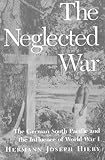The Neglected War : The German South Pacific and the Influence of World War I / Hermann Hiery.
Material type: TextPublisher: Honolulu : University of Hawaii Press, [1995]Copyright date: ©1995Description: 1 online resource (384 p.)Content type:
TextPublisher: Honolulu : University of Hawaii Press, [1995]Copyright date: ©1995Description: 1 online resource (384 p.)Content type: - 9780824864897
- 995 20
- D577 .H48 1995eb
- online - DeGruyter
| Item type | Current library | Call number | URL | Status | Notes | Barcode | |
|---|---|---|---|---|---|---|---|
 eBook
eBook
|
Biblioteca "Angelicum" Pont. Univ. S.Tommaso d'Aquino Nuvola online | online - DeGruyter (Browse shelf(Opens below)) | Online access | Not for loan (Accesso limitato) | Accesso per gli utenti autorizzati / Access for authorized users | (dgr)9780824864897 |
Frontmatter -- Contents -- Figures, Maps, and Tables -- Preface -- Acknowledgments -- Introduction: The German Legacy -- 1. The First World War as a Turning Point -- 2. The German South Pacific under the Shadow of War: Australia and New Guinea (1914 –1921) -- 3. Micronesia and the War: A Special Case of Divide and Rule -- 4. Samoa and the New Zealand Experience (1914 –1921) -- 5. Indigenous Responses to the First World War -- 6. Paris, the Versailles Treaty, and the Fate of Germany’s South Pacific Colonies -- 7. “New” Colonial Policy and Indigenous Interpretations of Colonial Rule in the Light of the First World War -- Abbreviations -- Notes -- Bibliography -- Index -- About the Author
restricted access online access with authorization star
http://purl.org/coar/access_right/c_16ec
In the summer of 1914 Germany’s Pacific colonies were a quiet backwater of its empire. But the shots of Sarajevo shattered the Pacific as well as Europe. Within weeks of the outbreak of World war I Western Samoa - German territory to be taken in the war - New Guinea, and the Micronesian lands, were occupied by Australian, New Zealand, and Japanese forces. Current historiography claims that World War I made little difference to the indigenous populations of the Pacific and that this change in colonial masters had little effect on those they ruled. The Neglected War challenges this interpretation. World War I and its aftermath, Hermann Hiery claims, had a tremendous effect on the Pacific Islands, Hiery details the policies pursued by Australia, New Zealand, and Japan, showing how each viewed and treated the indigenous populations. Administered by military officers with little civil oversight, the new colonial regimes employed the mandates they had received at the Paris Peace Conference with impunity. Hiery’s scrupulous review of the evidence, gathered from largely unknown primary sources, has uncovered a story of masquerades and coverups, negligence and duplicity, leading in some cases to full blown atrocities. Most of all, he tells the story of Pacific Islanders ,how they coped with the dramatic changes brought about by the war, and how they tried to influence its consequences. Many Islanders were fully aware that their political destiny was to be redefined after the war, and a few even saw it as an opportunity to achieve independence. This is also the story of their failure. Behind the evidence gathered here lie fundamental questions. How important are the differences in the nature of particular colonial regimes, and what effect do such differences have on indigenous peoples? How do indigenous peoples interpret disparities in colonial rule? This revisionist work addresses these issues while shedding light on a crucial time in the history of the Pacific.
Mode of access: Internet via World Wide Web.
In English.
Description based on online resource; title from PDF title page (publisher's Web site, viewed 02. Mrz 2022)


